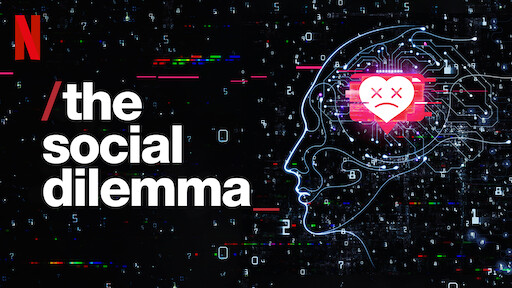
The Social Dilemma is a Netflix documentary that we watched in class this week, and honestly, I think it is manipulative, melodramatic and, does not attempting to inform or fix any of these social media companies’ valid critiques. It seems to me that this documentary was created for the express purpose to scare people about using social media. The filmmakers used a myriad of traditional scare tactics (for example: horror music underscoring, framing of the shot during interviews, montage of horrifying news clips, and the use of darker colors, etc.) to fear monger, and there are no contradictory opinions presented in this film. I would be very interested to know why these people were selected for this documentary. Why are they no longer working in social media? What did they gain with this exposure? There is no way that I can talk about everything I didn’t like about the film, however I can start.
There are many big and oversimplified claims made in this documentary meant to garner a fear response in their audience. The biggest is "we are the product". This is an oversimplification of the interaction between social media companies and businesses. They brought Shoshana Zuboff into an interview to talk about social media since she created the term “surveillance capitalism” in reference to this industry. The reference to human futures trading seems like a great tagline, but what does that really mean? What is futures trading and does that metaphor hold up? I don’t know. I am not a business major, but it seems to me that if they aren’t willing to show any elaboration on what they mean, it probably isn’t a strong point. The film is littered with one-liners that are meant to frighten the viewers about social media.
The next point the documentary tries to make is that social media dictates our perception of reality, which is true and concerning to a point. However, the way that the documentary has displayed this idea about algorithm, pushing content, and so forth is melodramatic, oversimplified, and misleading. The advertising element of social media is pushed as an evil entity that is buying people. For one, if you don’t know that advertisers pay to get their content shown to you, that seems to be on you. That is the very job of advertisement. However, this film takes almost all agency from the people being advertised to which is silly! We the people still have the ability to scroll away, to turn something off, and to not make a purchase. Implying that we do not just because social media exists is just plain wrong.
Probably the most concerning claim is the mental health implications of social media use. Social media addiction is a term that was thrown around in the film. While it can become a problem, I don't believe social media is any more addictive than anything else that creates dopamine. If you find yourself struggling with social media addiction, absolutely get help. But that isn't a common experience. Another big topic was the spike in teenage depression factors. This is a real concern and should not be treated lightly, however social media use and reported cases of depression are, at most, a correlation. There is no evidence to suggest a direct link between these two, and it should fall onto the parents and role models in a child's life to educate and guide the younger generation about interaction online, just like they educate them on interaction in the real world.
How do we navigate the legitimate path forward while addressing some of the concerns raised in the video? Let's look at what the interviewees are trying to do. Tristan Harris is a prominent figure in the crusade against social media, however if we look at his businesses actual proposals for how to change the online world. Nowhere is an action plan to solve the problem that Harris has made a name for himself to fight. If the people condemning social media can't even figure out a logistical solution, how can we put all our trust in what they have to say? This isn't a one size fits all solution and there is no way that the world online is going away.
So, why are we watching it in our class about utilizing social media? I think it is important to learn how to decipher every bit of media you consume. Obviously, I am incredibly biased against this film. To me, it was almost laughable in its attempt to paint social media as a villain, falling victim to tropes that destroy a lot of credibility in my opinion. I don't think the concerns about privacy and mental health implications are completely wrong or should be ignored. It is a great place to start a conversation about safe social media practices, but we need to acknowledge the manipulation and fear mongering that this documentary employs to sway their audience so that we can make the best decision for our lives.
~~~~~~~~~~~~~~~~~~~~~~~~~~~~~~~~~~~~~~~~~~~~~~~~~~~~~~~~~~~~~~~~~~~~~~~~~~
To learn more about this, check out the Foundation for Economic Education's YouTube two part video critique, "The Social Dilemma is Dangerously Wrong...". It helped put this film into a little more context for me.
Link to Part 1: The Social Dilemma Is Dangerously Wrong... Part I




I love how in depth you went with your analysis of this film. I do agree that the depiction of social media as a villain was out of proportion and somewhat laughable. There are many points in the film that I thought were interesting and made me look at social media in a different light, though.
ReplyDeleteI agree, there were definitely some interesting points made. It made me think about why they said what was said and how they came to their conclusions. However, it is hard for me to take information from such a biased source without fact checking it a thousand times on a thousand different sources.
Delete